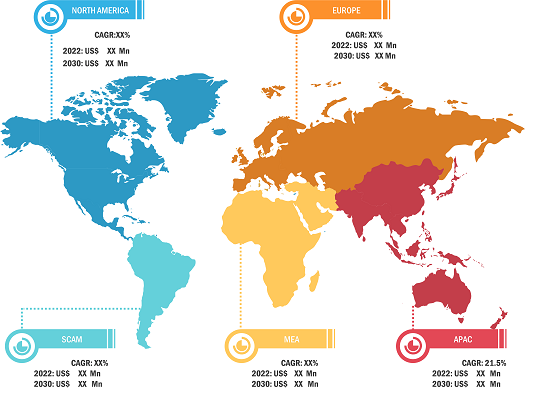Benefits of Frequent Flyer Program Boost Airline Ancillary Services Market Growth
According to our latest study on “Airline Ancillary Services Market Forecast to 2030 – COVID-19 Impact and Global Analysis – by Type and Carrier Type,” the airline ancillary services market size is expected to reach US$ 728.53 billion by 2030 from 168.80 billion in 2022. The market is estimated to record a CAGR of 20.1% from 2022 to 2030.
Airline Ancillary Services Market – by Region, 2022 and 2030
Airline Ancillary Services Market Forecast to 2030 - Global Analysis by Type (Baggage Fees, On-Board Retail and A La Carte Services, Airline Retail, and FFP Mile Sales) and Carrier Type (Full-Service Carriers and Low-Cost Carriers)
Airline Ancillary Services Market Opportunities by 2030
Download Free Sample
The frequent flyer program (FFP) is a loyal and sustainable way for airline authorities to maintain a good relationship with their regular passengers. With this program, the airlines form several partnership arrangements and cooperative schemes. These include code-sharing agreements resulting in competitive fares and variations in the occurrence of services to increase profits and market share. The airlines constantly award reward points to their frequent flyers through cashback rewards, travel insurance, emergency medical services, and access to airport lounges. Similarly, travel clubs worldwide also offer advanced services to enhance airline brands by converting brand affinity into brand equity and adding new ancillary revenue from subscription fees. In December 2022, American Airlines announced changes to its FFP, such as new levels and a lower threshold for receiving perks. The Airline removed its mileage cap for expensive flights and announced new extras, including Avis rental car preferred status. This further boosted the loyalty of airlines toward its passengers and enhanced the ancillary services revenue. Further, the airlines are continuously focusing on boosting their margin and offering value-added services to the passengers to maintain a loyal relationship with frequent flyers.
The airline ancillary services market is segmented on the basis of type and carrier type. Based on type, the market is segmented into baggage fees, on-board retail and a la carte services, airline retail, FFP mile sales, and others. Based on carrier type, the airline ancillary services market is bifurcated into full-service carriers and low-cost carriers. The airline ancillary services market, by region, is segmented into North America, Europe, Asia Pacific, the Middle East & Africa, and South America.
Impact of COVID-19 Pandemic on Airline Ancillary Services Market Growth
The COVID-19 outbreak considerably impacted the global economy during its peak in Q1 and Q2 of 2020 and hampered business activities in various industries. Governments of various countries imposed stringent regulations on human movement and trade bans. Due to economic uncertainties and reduced purchasing power, consumer demand for airline services declined during the COVID-19 pandemic. This decrease in demand directly impacted the requirement for airline ancillary services among consumers. However, the ease of lockdown and travel measures encouraged the adoption of airline ancillary services, thereby driving the airline ancillary services market growth.
United Airlines Holdings Inc, American Airlines Group Inc, Delta Air Lines Inc, EasyJet Plc, Deutsche Lufthansa AG, Qantas Airways Ltd, Ryanair Holdings Plc, Southwest Airlines Co, The Emirates, and Air France KLM SA are among the key players operating in the airline ancillary services market.
Contact Us
Phone: +1-646-491-9876
Email Id: sales@theinsightpartners.com